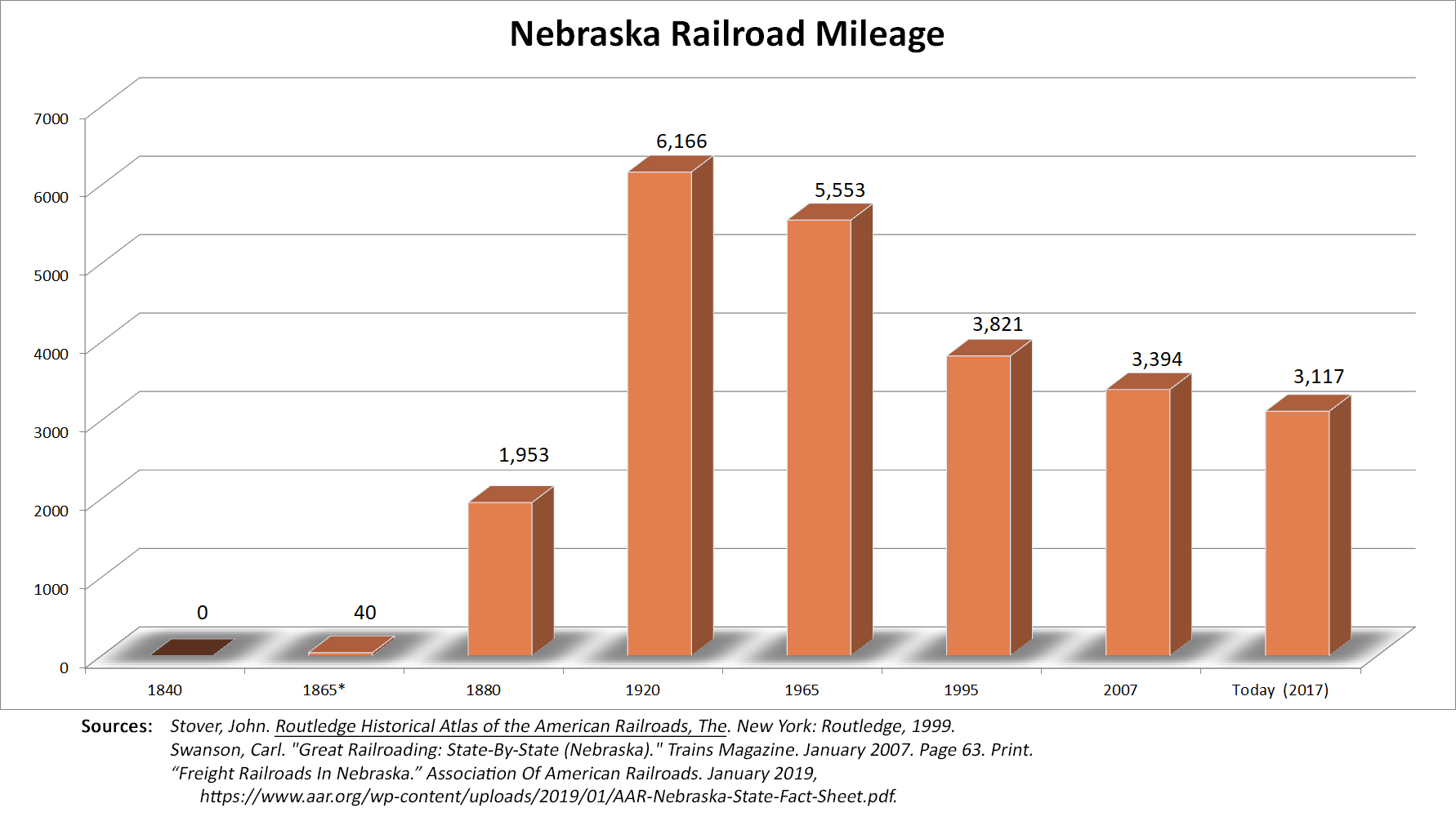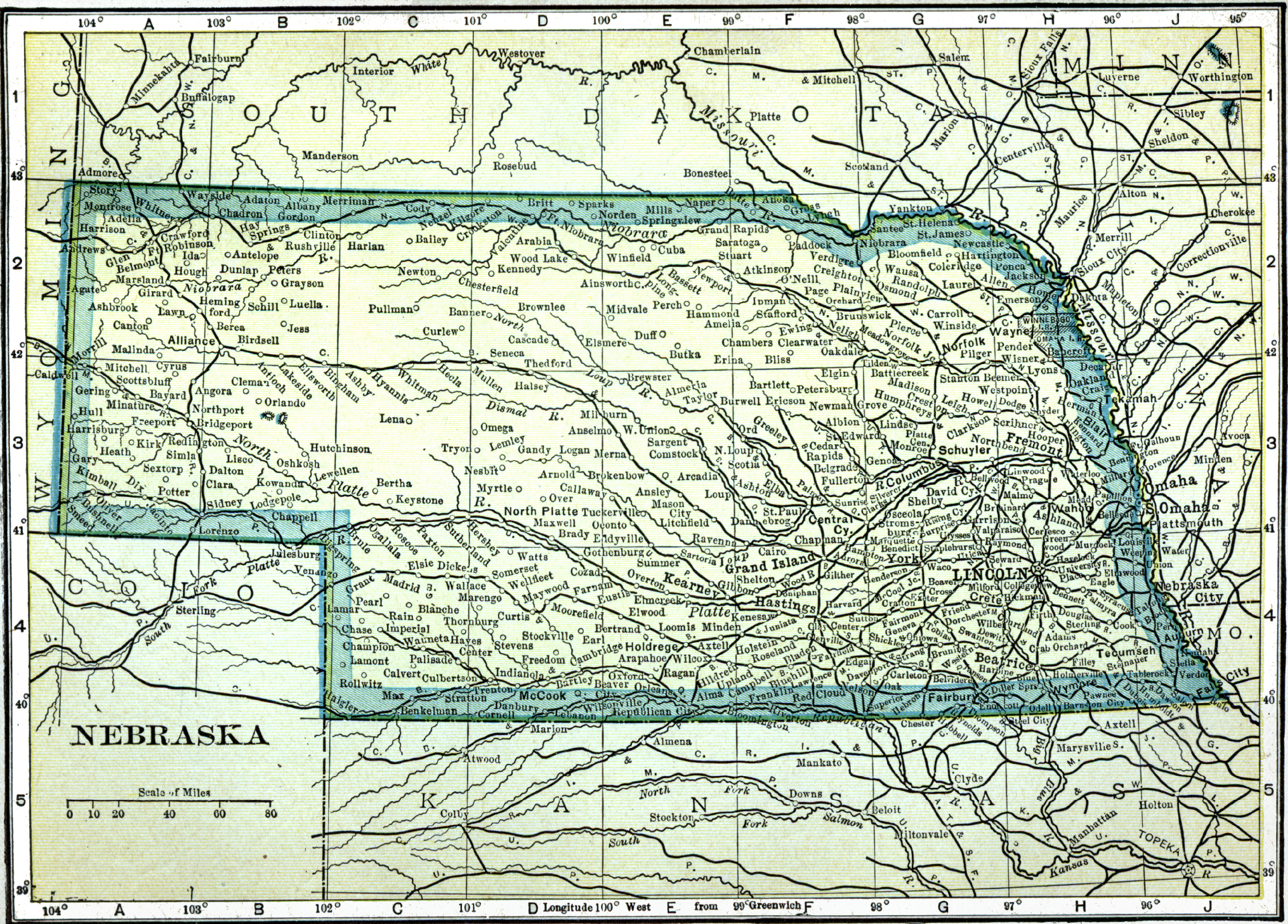- Home ›
- The States ›
- Nebraska
Nebraska Railroads: State Map, History, Abandoned Lines
Last revised: September 7, 2024
By: Adam Burns
Nebraska can somewhat be compared to the aviation term
“flyover country,” in that the state sees plenty of through trains
heading to either Chicago or the West Coast.
The term, however, is in no way meant to be demeaning to Cornhuskers as one can witness quite a parade and variety of trains hitting 70 mph on their way east or west with their only stop a quick refueling at places like Union Pacific’s Bailey Yard in North Platte.
History
Prior to today's mega-merger movement, Nebraska was regarded as another of the "granger states", with several classic railroads reaching across its borders to tap its many agricultural interests.
One notable route here was Chicago & North Western's so-called "Cowboy Line" which ran as west as Lander, Wyoming. It was the company's attempt to open its own transcontinental corridor.
Alas, the C&NW ran out of money before accomplishing the feat and the route became little more than a long branch line.
Today, the state still boasts five of the seven Class Is, two regionals, and a number of short lines.
All in all, Nebraska railroads are best known for traveling through flat, open country, lots of trains, plenty of grain, the Union Pacific, and long drags of coal heading east from Wyoming’s Powder River Basin.
Photos
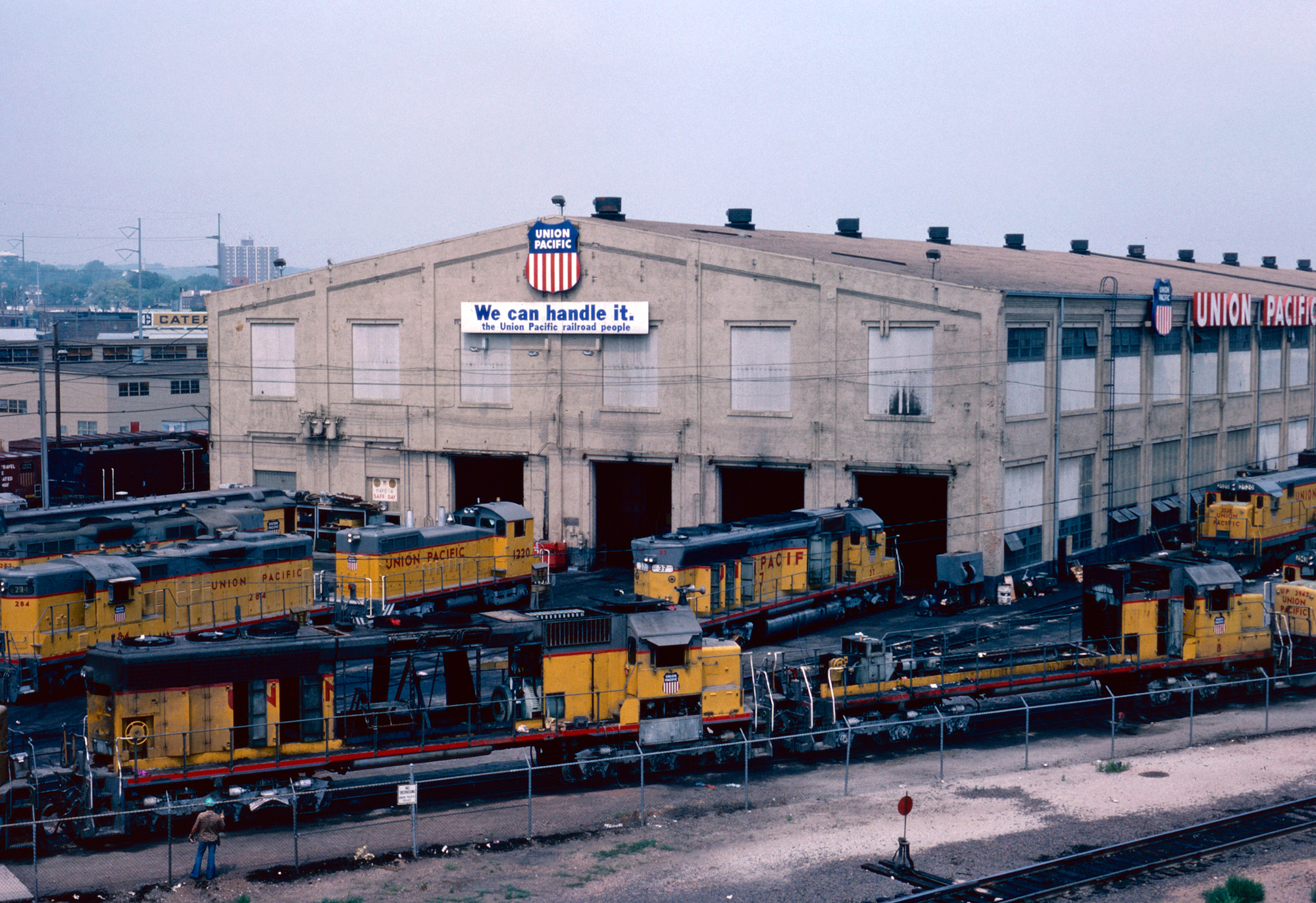 Union Pacific power (and shells) at the shops in Omaha, Nebraska; June, 1981.This facility closed in 1988 to make way for a convention center. American-Rails.com collection.
Union Pacific power (and shells) at the shops in Omaha, Nebraska; June, 1981.This facility closed in 1988 to make way for a convention center. American-Rails.com collection.Nebraska's trains date back to 1862 when the Pacific Railroad Act (signed into law by President Abraham Lincoln) allowed for construction to begin on the Transcontinental Railroad, with the Union Pacific heading west from Omaha (and the Central Pacific building eastward from Sacramento, California).
The Union Pacific, of course, would go on to becoming one of the West's largest railroads reaching Portland, Oregon and Los Angeles via its own lines.
Abandoned Lines
Nebraska was a classic granger state and handled significant agriculture traffic. In addition, it was the eastern terminal of the Transcontinental Railroad at Omaha.
While the Rock Island (main line to Denver/Colorado Springs), Missouri Pacific (a few southern branches and service to Omaha), and Milwaukee Road (Omaha) provided some service to Nebraska it was the Burlington, Chicago & North Western, and Union Pacific that provided the bulk of rail service here.
All three operated numerous through routes and secondary corridors all across the state. The Burlington maintained three especially important routes (Omaha-Denver, Denver-Kansas City via southern Nebraska, and Kansas City-Montana/Wyoming that cut across the state) while Union Pacific's main line headed due west for Salt Lake City.
The C&NW was perhaps the most interesting. The railroad had a major Chicago-Omaha route and a main line heading due west from Omaha to Lander, Wyoming.
What famously became known as the "Cowboy Line" was originally intended to become a direct route to the Pacific coast.
However, the railroad ran out of funds before this line could be completed. It eventually became a very long agricultural branch and surprisingly remained in service until the early 1990's.
Today, stretches of the right-of-way can be seen across Nebraska and Wyoming while a large section has been converted into a trail.
Many of Nebraska's abandoned lines are, in fact, former C&NW corridors. In addition, you can find old branches of the Union Pacific, Burlington, and Missouri Pacific.
For interurban historians/fans you might be interested in exploring Omaha's two abandoned lines, the Omaha & Southern Interurban Railway and Omaha & Lincoln Railway & Light Company.
The other notable, the Omaha, Lincoln & Beatrice Railway ("The Big Red Line") has remained active since 1903 and today serves Lincoln as a successful short line freight railroad.
Statistics
It grew exponentially following the 1950s buying out several classic lines like the Missouri Pacific and Southern Pacific making it the largest operating Class I in the country and the oldest to never have its name changed through merger or takeover.
Interestingly, UP retains its headquarters in the city that started it all, Omaha. Along with the Union Pacific, Nebraska would be home to a number of other well known railroads.
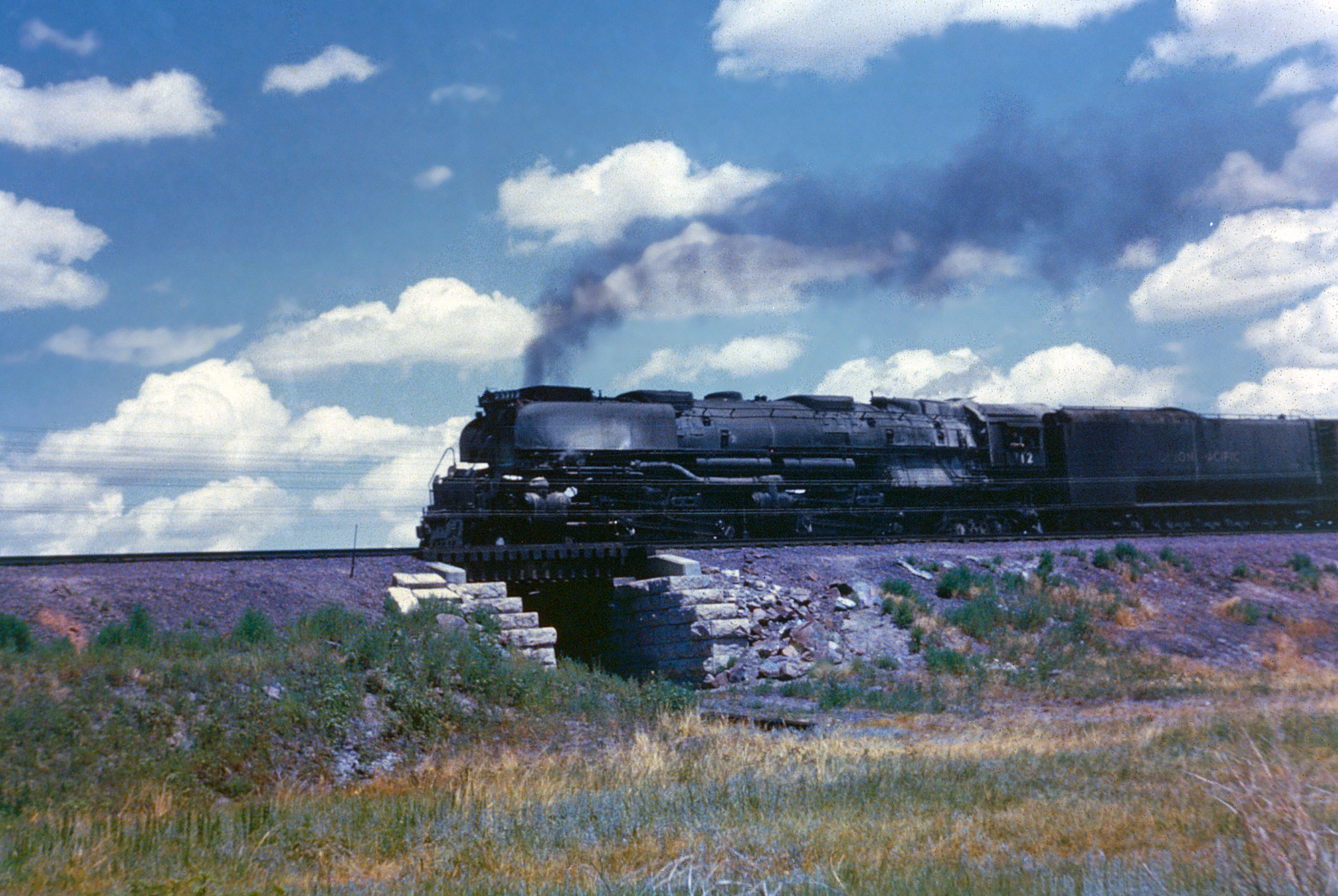 Union Pacific 4-6-6-4 #3712 hustles west near Sidney, Nebraska on July 18, 1959. Richard Wallin photo. American-Rails.com collection.
Union Pacific 4-6-6-4 #3712 hustles west near Sidney, Nebraska on July 18, 1959. Richard Wallin photo. American-Rails.com collection.Current Railroads
- Union Pacific
- BNSF Railway
- Canadian National
- Canadian Pacific
- Kansas City Southern
- Nebraska, Kansas & Colorado Railway
- Manning Railroad
- Brandon Railroad
- Nebraska Central Railroad
- Nebraska Northeastern Railway
- Omaha, Lincoln & Beatrice Railway
- Sidney & Lowe Railroad
- Rapid City, Pierre & Eastern Railroad
Today, Nebraska's rail network consists of around 3,400 miles. During the industry's "Golden Age", however, the state boasted some 6,100+ miles of track.
With a decline of about 45% of its infrastructure, this is about average with what other states have experienced.
State Mileage Chart
First Railroad
* Nebraska's first railroad was, of course, the Union Pacific, established by the Pacific Railroad Act signed into law by President Abraham Lincoln on July 1, 1862. It was intended to connect with the Central Pacific building east from Sacramento, California in opening the nation's first transcontinental railroad.
Despite such plans UP was very slow in actually launching construction. In his book, "The Men Who Built The Transcontinental Railroad: 1863-1869," author Stephen Ambrose notes the railroad did not lay its first rail until July, 1865!
By the end of that year authors Joe Welsh and Kevin Holland point out in their book, "Union Pacific Railroad," the company was finally able to open 40 miles west of Omaha.
Six years later it would meet the Central Pacific at Promontory Summit, Utah on May 10, 1869 although a direct connection with the national network was not opened until 1872 when a bridge was finally completed over the Missouri River between Omaha, Nebraska and Council Bluffs, Iowa.
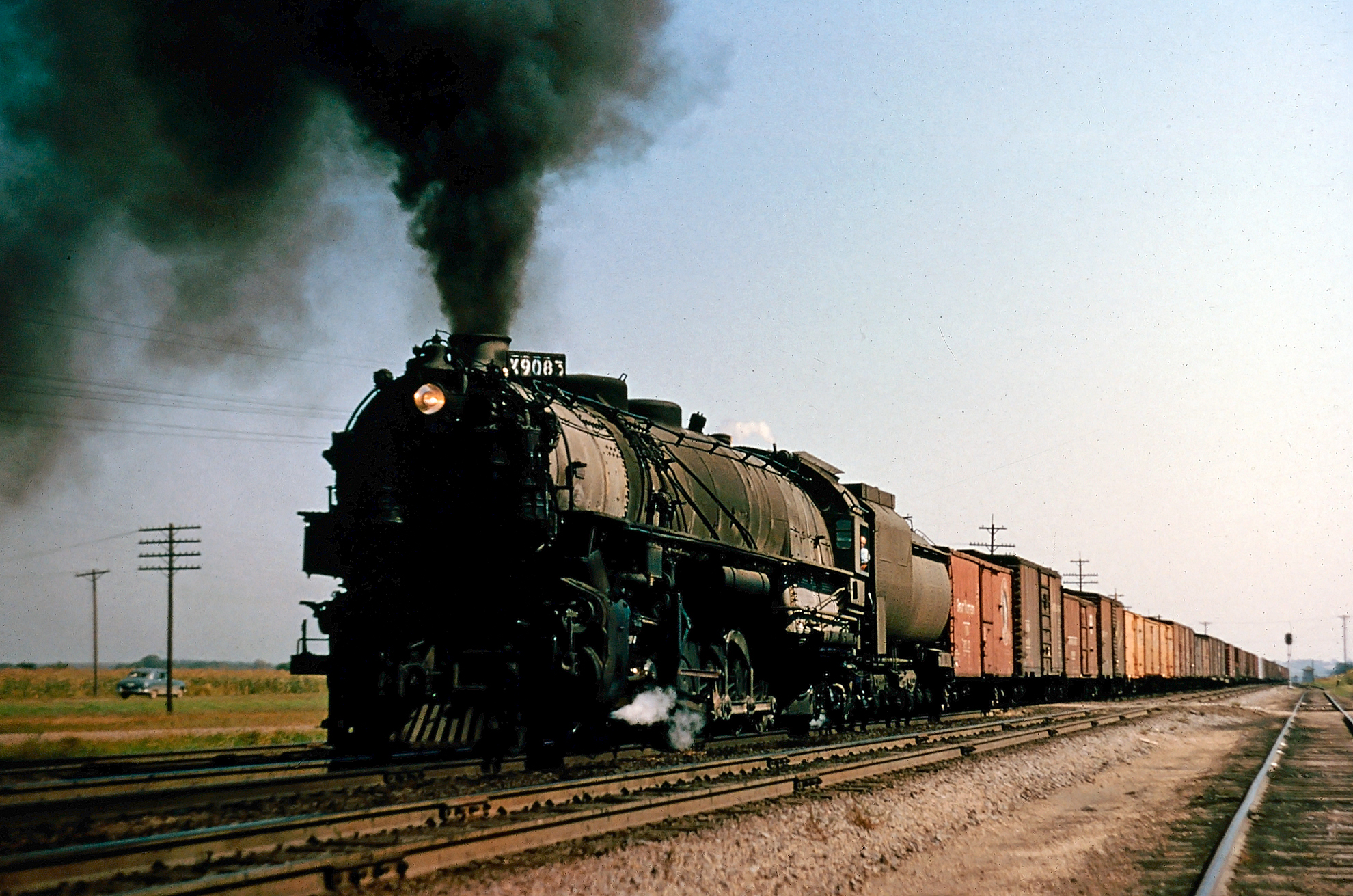 One of Union Pacific's big 4-12-2's, #9083, leads a westbound through the small community of Big Springs, Nebraska in the summer of 1952. Jim Hinkhouse photo. American-Rails.com collection.
One of Union Pacific's big 4-12-2's, #9083, leads a westbound through the small community of Big Springs, Nebraska in the summer of 1952. Jim Hinkhouse photo. American-Rails.com collection.However, Nebraska has fared better than many other granger states, which were hit hard by abandonments and cutbacks as several experienced staggering losses upwards of 60% or more.
In any event, for more information about Nebraska, in terms of rail mileage over the years please have a look at the chart below.
State Map (1909)
While Nebraska once featured famous passenger trains like the Union Pacific’s City fleet and Burlington’s Zephyrs, today only Amtrak’s California Zephyr
operates through the state serving Lincoln, Hastings, Holdrege, McCook
and Omaha.
To learn more about many of these famed passenger trains
please click here to visit the streamliner section of the site, which highlights the City and Zephyr fleets among others.
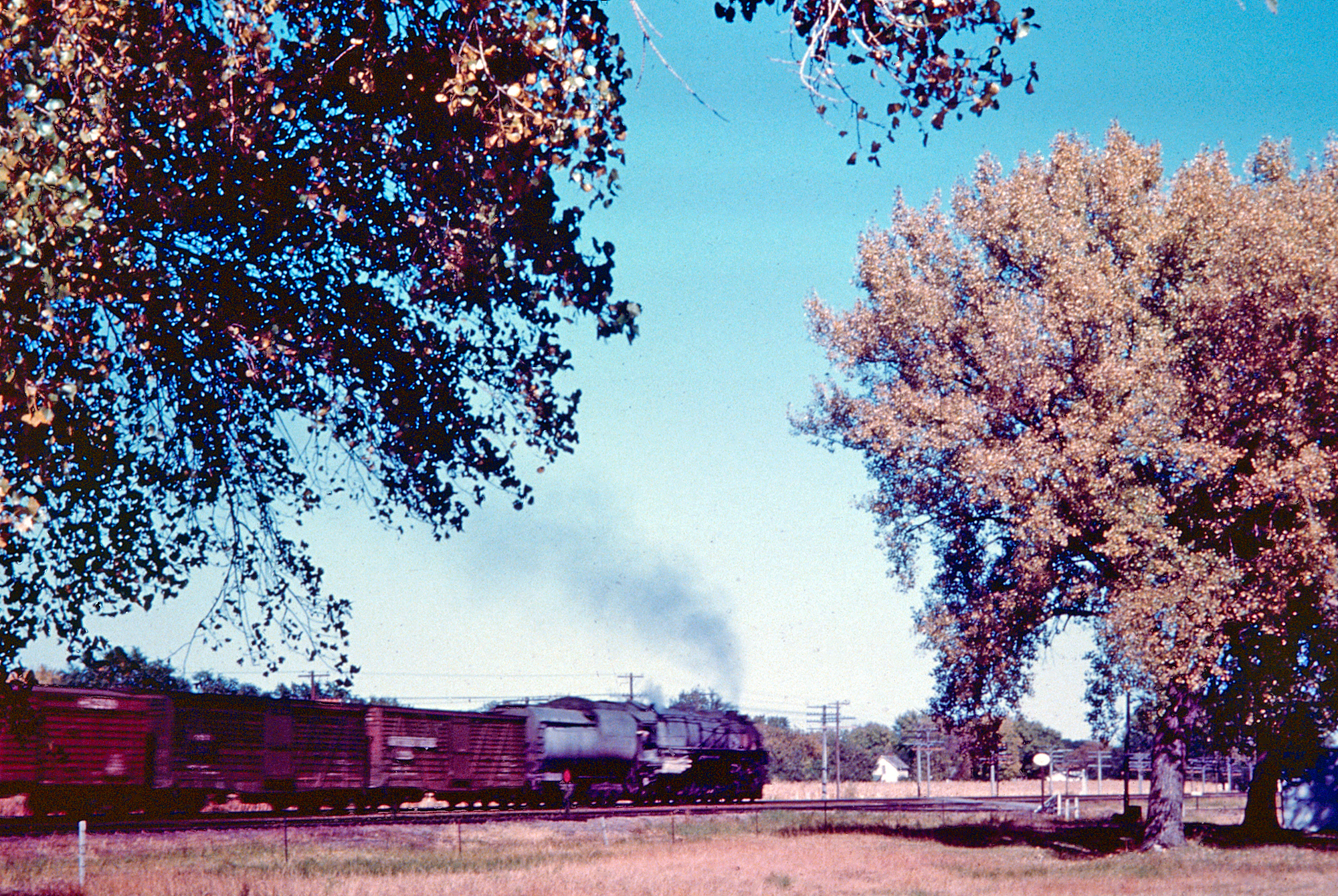 A Union Pacific 4-8-4 leads a string of livestock cars and other freight west through western Nebraska during the 1950s. Ed Olsen photo. American-Rails.com collection.
A Union Pacific 4-8-4 leads a string of livestock cars and other freight west through western Nebraska during the 1950s. Ed Olsen photo. American-Rails.com collection.Lastly, be sure and stop by one of the state’s several museums or better yet, ride the Fremont Dinner Train based in Fremont!
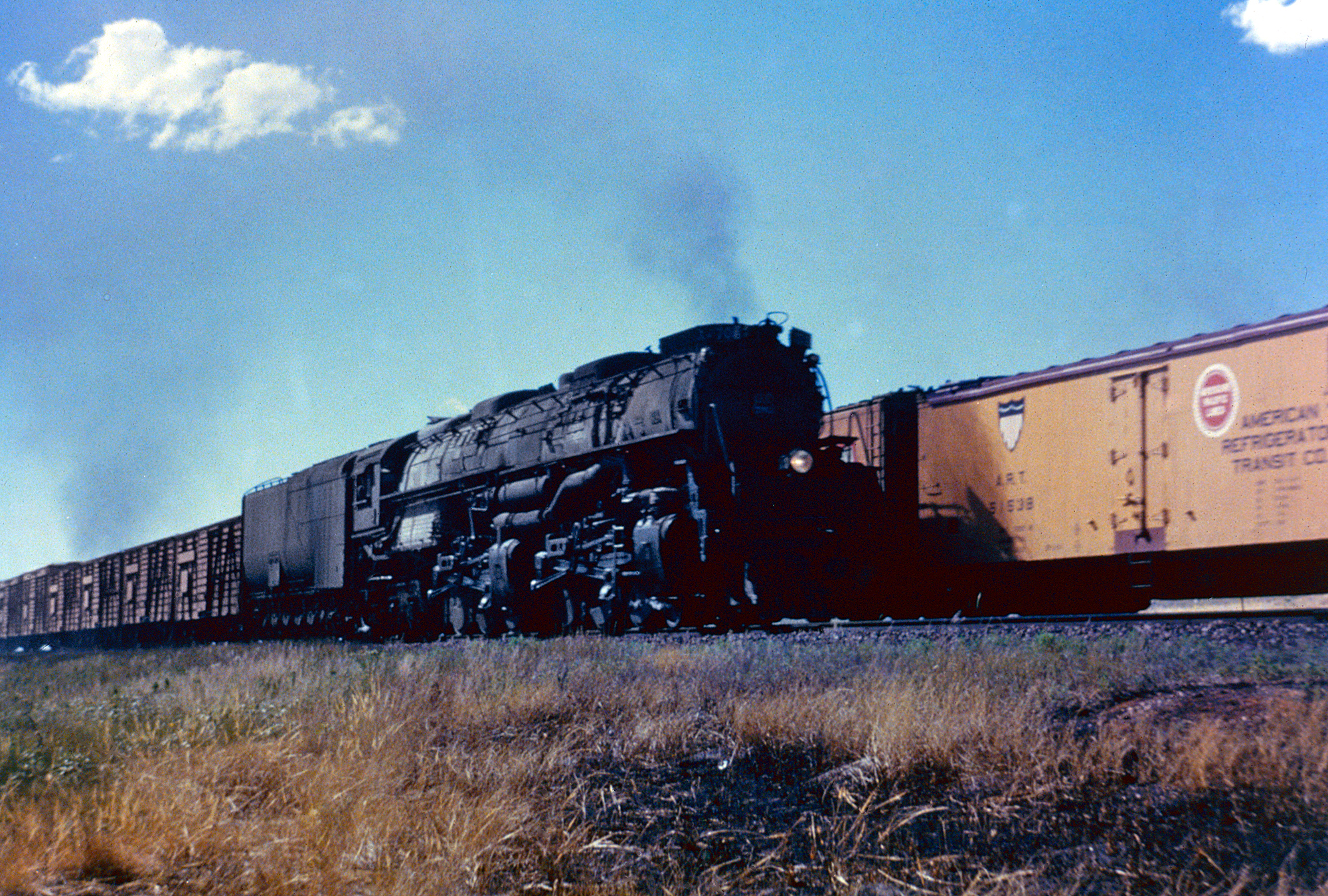 Union Pacific 4-6-6-4 #3702 heads east with livestock cars near Sidney, Nebraska on July 10, 1959. Richard Wallin photo. American-Rails.com collection.
Union Pacific 4-6-6-4 #3702 heads east with livestock cars near Sidney, Nebraska on July 10, 1959. Richard Wallin photo. American-Rails.com collection.Aside from the Fremont Dinner Train you can visit the Durham Western Heritage Museum, Fremont & Elkhorn Valley Railroad, Stuhr Museum of the Prairie Pioneer, and Trail & Rails Museum to learn more about Nebraska’s rail heritage.
In all, while Nebraska may look only like flat, boring farmland it offers an exciting and interesting mix of railroad operations (few other states offer such high speed freight railroads as Nebraska!).
Recent Articles
-
Missouri ~ Murder Mystery ~ Dinner Train Rides
Jan 26, 26 01:21 PM
Missouri, with its rich history and scenic landscapes, is home to one location hosting these unique excursion experiences. -
Washington's ~ Murder Mystery ~ Dinner Train Rides
Jan 26, 26 01:15 PM
This article delves into what makes murder mystery dinner train rides in Washington State such a captivating experience. -
Utah's - Wine Tasting - Train Rides
Jan 26, 26 12:48 PM
Utah, a state widely celebrated for its breathtaking natural beauty and dramatic landscapes, is also gaining recognition for an unexpected yet delightful experience: wine tasting trains. -
Vermont's - Wine Tasting - Train Rides
Jan 26, 26 12:40 PM
Known for its stunning green mountains, charming small towns, and burgeoning wine industry, Vermont offers a unique experience that seamlessly blends all these elements: wine tasting train rides. -
Rhode Island's - Wine Tasting - Train Rides
Jan 26, 26 12:36 PM
It may the smallest state but Rhode Island is home to a unique and upscale train excursion offering wide aboard their trips, the Newport & Narragansett Bay Railroad. -
Oregon's - Wine Tasting - Train Rides
Jan 26, 26 12:25 PM
For those looking to explore this wine paradise in style and comfort, Oregon's wine tasting trains offer a unique and enjoyable way to experience the region's offerings. -
Virginia's - Wine Tasting - Train Rides
Jan 26, 26 12:07 PM
Wine tasting trains in Virginia provide just that—a unique experience that marries the romance of rail travel with the sensory delights of wine exploration. -
Tennessee's - Wine Tasting - Train Rides
Jan 26, 26 12:44 AM
One of the most unique and enjoyable ways to savor the flavors of Tennessee’s vineyards is by train aboard the Tennessee Central Railway Museum. -
Texas's Thomas The Train Rides
Jan 25, 26 01:41 PM
In the heart of Texas, where everything is said to be bigger and bolder, lies an event that captures the imagination of children and families alike - A Day Out With Thomas. -
New York's Thomas The Train Rides
Jan 25, 26 01:37 PM
These events, part of a national tour, are crafted for young Thomas fans and their families to enjoy an immersive experience filled with adventure, nostalgia, and sheer joy. -
Connecticut's Dinner Train Rides In Essex!
Jan 25, 26 01:34 PM
Connecticut's rail heritage can be traced back to the industry's earliest days and a few organizations preserve this rich history by offering train rides. The Essex Steam Train also hosts dinner-theme… -
Minnesota's Dinner Train Rides In Duluth!
Jan 25, 26 01:25 PM
One of the best ways to feel the region's history in motion today is aboard the North Shore Scenic Railroad (NSSR), which operates out of Duluth’s historic depot. -
North Carolina's - Wine Tasting - Train Rides
Jan 25, 26 01:18 PM
A noteworthy way to explore North Carolina's beauty is by hopping aboard the Great Smoky Mountains Railroad and sipping fine wine! -
Nevada's - Wine Tasting - Train Rides
Jan 25, 26 01:13 PM
While it may not be the first place that comes to mind when you think of wine, you can sip this delight by train in Nevada at the Nevada Northern Railway. -
New Hampshire's - Wine Tasting - Train Rides
Jan 25, 26 01:02 PM
This article details New Hampshire's most enchanting wine tasting trains, where every sip is paired with breathtaking views and a touch of adventure. -
Front Range Passenger Rail [Fort Collins-Pueblo, CO]
Jan 25, 26 12:59 PM
Front Range Passenger Rail is a proposed project to link Fort Collins to Pueblo, Colorado by rail via Denver and Boulder. It hopes to be operational by the early 2030s. -
Indiana "Valentine's" Train Rides
Jan 24, 26 12:53 PM
If you’ve ever wished you could step into a time when passenger trains were a Saturday-night treat and a whistle echoing across farm fields meant “adventure,” the Nickel Plate Express delivers that fe… -
Ohio "Valentine's" Train Rides!
Jan 24, 26 12:46 PM
The Hocking Valley Scenic Railway offers one of the region’s most atmospheric ways to experience the Hocking Hills area: from the rhythmic click of jointed rail to the glow of vintage coaches rolling… -
Arkansas "Dinner Train" Rides On The A&M!
Jan 24, 26 12:40 PM
If you want a railroad experience that feels equal parts “working short line” and “time machine,” the Arkansas & Missouri Railroad delivers in a way few modern operations can. -
North Carolina's Dinner Train Rides At NCTM!
Jan 24, 26 12:34 PM
Tucked into the Piedmont town of Spencer, the North Carolina Transportation Museum is the kind of place that feels less like a typical museum and more like a living rail yard that never quite stopped… -
Colorado's Thomas The Train Rides
Jan 24, 26 12:30 PM
One of the most picturesque locations to see the beloved Thomas the Tank Engine is Colorado at the Colorado Railroad Museum in Golden. -
Iowa's Thomas The Train Rides
Jan 24, 26 12:26 PM
This article explores the magical journey of spending a day with Thomas and what families can expect from this unforgettable experience in Iowa. -
New Jersey's - Wine Tasting - Train Rides
Jan 24, 26 12:21 PM
If you're seeking a unique outing or a memorable way to celebrate a special occasion, wine tasting train rides in New Jersey offer an experience unlike any other. -
Missouri's - Wine Tasting - Train Rides
Jan 24, 26 12:19 PM
The fusion of scenic vistas, historical charm, and exquisite wines is beautifully encapsulated in Missouri's wine tasting train experiences. -
Minnesota's - Wine Tasting - Train Rides
Jan 24, 26 12:17 PM
This article takes you on a journey through Minnesota's wine tasting trains, offering a unique perspective on this novel adventure. -
Massachusetts's - Wine Tasting - Train Rides
Jan 24, 26 12:17 PM
This article dives into some of the alluring aspects of wine by rail in Massachusetts, currently offered by the Cape Cod Central Railroad. -
Kentucky ~ Murder Mystery ~ Dinner Train Rides
Jan 24, 26 12:13 PM
In the realm of unique travel experiences, Kentucky offers an enchanting twist that entices both locals and tourists alike: murder mystery dinner train rides. -
Utah ~ Murder Mystery ~ Dinner Train Rides
Jan 24, 26 12:12 PM
This article highlights the murder mystery dinner trains currently avaliable in the state of Utah! -
North Carolina Scenic Train Rides At The GSMR!
Jan 23, 26 11:47 AM
The Great Smoky Mountains Railroad (GSMR) has become one of the flagship heritage rail experiences in the Southeast. -
Ohio Scenic Train Rides In Nelsonville!
Jan 23, 26 11:42 AM
The Hocking Valley Scenic Railway (HVSR) offers something rare in today’s world: the chance to experience a working slice of 19th- and 20th-century railroading on an historic right-of-way. -
Tennessee "Dinner Train Rides" At The TVRM!
Jan 23, 26 10:59 AM
Tucked into East Chattanooga, the Tennessee Valley Railroad Museum (TVRM) is less a “museum you walk through” and more a railroad you step aboard. -
California "Dinner Train Rides" In Sacramento!
Jan 23, 26 10:36 AM
Just minutes from downtown Sacramento, the River Fox Train has carved out a niche that’s equal parts scenic railroad, social outing, and “pick-your-own-adventure” evening on the rails.

